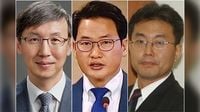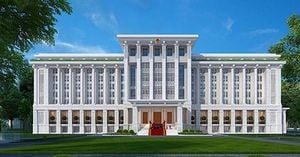On June 12, 2025, the Jo Guk Innovation Party officially announced its recommendations for candidates to serve as special prosecutors under the newly enacted "3 Special Prosecutor Laws," which address pivotal cases involving domestic rebellion, allegations connected to Kim Kun-hee, and the Chae Sang-byeong case. At a press briefing held at the National Assembly, party spokesperson Yoon Jae-gwan introduced Han Dong-soo, Shim Jae-cheol, and Lee Myung-hyun as the nominees for these critical investigative roles.
The chosen candidates bring a wealth of experience from the judiciary, prosecution, and military legal sectors, reflecting the party's emphasis on professionalism and public trust. Han Dong-soo, recommended for the domestic rebellion special prosecutor role, is a former head of the Daejeon High Prosecutors' Office Inspection Department and served previously as the head of the Supreme Prosecutors’ Office Inspection Department. Shim Jae-cheol, nominated for the Kim Kun-hee special prosecutor, is a former head of the Seoul Southern District Prosecutors' Office and previously led the Ministry of Justice Prosecution Bureau. Lee Myung-hyun, selected for the Chae Sang-byeong special prosecutor, served as the head of the Ministry of National Defense Prosecution Corps High Prosecution Bureau, bringing military legal expertise to the table.
Yoon Jae-gwan highlighted that all three candidates are "former and current members of the judiciary, prosecution, and military legal offices who meet the public's expectations." He underscored their alignment with the party's core principles, which include a resolute commitment to rooting out internal rebellion, a strong reformist spirit, and the courage to resist external pressures and solicitations. Furthermore, the candidates possess "investigative expertise that reassures the public and proven competence," along with the leadership qualities necessary to command prosecutors and investigators effectively.
The Innovation Party detailed that their selection process was guided by four main criteria: an unwavering will to resolve internal rebellion and drive reforms, a steadfast character that rejects external interference, the professional investigative skills with verified proficiency, and the leadership to oversee and direct legal teams. These principles were designed to ensure that the special prosecutors would not only be capable but also trustworthy in handling the sensitive and high-profile cases ahead.
Special prosecutors in South Korea face stringent requirements, including a maximum investigation period of 170 days and a prohibition on practicing law for two to three years to maintain impartiality while managing indictments. Despite initial concerns about the suitability of some candidates, the Innovation Party expressed confidence that their nominees fully meet these demanding standards.
Addressing questions about Han Dong-soo’s lack of direct investigative experience—given his background as a judge and judicial researcher—Innovation Party strategist Lee Kyu-won explained that Han's extensive tenure in the judiciary and his leadership role at the Daejeon High Prosecutors' Office Inspection Department compensate for this. Lee also noted that the special prosecutor system allows for the appointment of several deputy special prosecutors, who are expected to be experienced prosecutors themselves, thus providing mutual support and complementing Han's expertise.
Shim Jae-cheol’s nomination sparked some debate due to his previous professional encounters with former President Yoon Seok-yeol, particularly when Yoon served as Prosecutor General. Critics questioned whether this history might compromise the fairness of investigations. However, Lee Kyu-won dismissed these concerns, emphasizing that the focus should be on Shim’s credentials as a former head of the Seoul Southern District Prosecutors' Office, which specializes in securities and financial crimes—key areas under investigation. Lee stated, "We prioritized his experience over any personal episodes," underscoring the importance of prosecutorial expertise in these complex financial cases.
The recommendations come shortly after President Lee Jae-myung formally requested the Democratic Party and the Jo Guk Innovation Party to submit candidates for the three special prosecutor positions. Each party is expected to nominate one candidate per special prosecutor role, resulting in a total of six nominees. The collaboration between the parties has involved minimal but necessary communication through regular channels, according to Lee Kyu-won, who described the coordination as "necessary minimal communication through normal communication channels."
This move reflects a broader political effort to address high-profile legal cases with transparency and rigor. The Jo Guk Innovation Party expressed hope that the special prosecutors would conduct swift and resolute investigations, delivering justice that has been delayed. Yoon Jae-gwan remarked, "We expect the special prosecutors to promptly and firmly investigate and impose appropriate punishments to correct deferred justice," and added, "We hope that the three we have recommended will be able to shoulder their responsibilities effectively."
The significance of these appointments is underscored by the public's strong desire for accountability in matters related to internal rebellion and alleged corruption. The party’s emphasis on selecting candidates who embody integrity, independence, and professional competence aims to restore confidence in the justice system and ensure that these sensitive investigations proceed without undue influence.
Images accompanying the announcements showed the candidates—Han Dong-soo, Shim Jae-cheol, and Lee Myung-hyun—underscoring their prominence and the gravity of the roles they are poised to undertake. The Jo Guk Innovation Party’s approach, rooted in clear principles and a commitment to reform, marks a decisive step in South Korea’s ongoing efforts to strengthen its legal and political institutions.
As the process moves forward, the collaboration between political parties and the public scrutiny surrounding these appointments will likely shape the trajectory of these investigations, which stand at the intersection of law, politics, and national security. The coming months will reveal how effectively these special prosecutors can navigate these challenges and deliver the justice that the nation demands.




